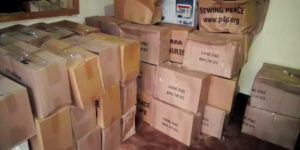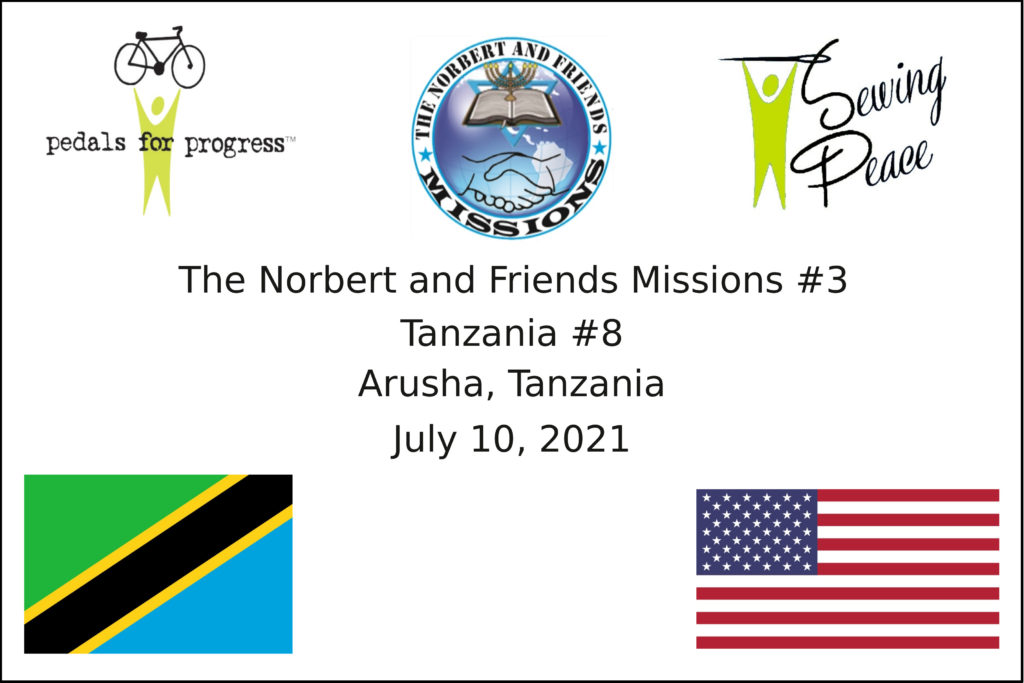All posts by Michael Sabrio
new training program in cameroon, summer 2021
By Clovert Mbenja
Summer 2021 Newsletter
Rising Hope Foundation for Change, in partnership with Sewing Peace, is implementing a program aimed at training vulnerable women and teenage girls in sewing, fashion, and design in Cameroon. This training program will empower these women with life skills such as tailoring, professional sewing, fashion and design, sewing machine repair, and basic computer knowledge. They will learn how to run tailoring businesses from their homes. Though women and girls at the entry point of the program may be unskilled, they will leave with a means to earn a livelihood, become trainers, and provide for their own families’ sewing needs. This program will promote and create female entrepreneurs and generate income. The program promotes economic self-reliance of women and girls in Cameroon and addresses the Sustainable Development Agenda 2030.
The zigzag sewing machines and other accessories sent by SP are very useful: they give a professional touch to the women who learn specialized sewing with different stitches. Some of the women have added new services because of the zigzag machine. At first, they had to travel long distances to use zigzag machines that are costly and unreliable. Now they can work at home or in our Centre.
We have also started a program to make and sell washable (and thus re-usable) sanitary pads to be used instead of the disposable ones. Thus we reduce the impact on the natural environment .
At the end of their training process, our trainees will be able to be either self-employed or hired as part of the team working on the washable sanitary pads.
This will have several benefits for the communities:
- skills development
- employment opportunities
- financial independence
- unemployment reduction
- poverty reduction
- better understanding of the menstrual cycle through the training for sanitary pad production
- better control of pregnancies
- better management of resources: options for education, potential for future earnings, and family planning
The Administration Entities in these regions will directly benefit from these programs, furthering their own objectives in terms of public health, social environment, and unemployment rates in the community, the region, and the country as a whole.
It will be a win-win situation for the Government, girls and women, and the community as a whole. Officially, Rising Hope Foundation for Change will launch the program in September 2021.
Success Stories
We gave some basic training to women who can sew but cannot afford a sewing machine. At the end of this 14-day training period, we gave them one sewing machine each. RHFC is excited and proud to bring these stories and thanks from the beneficiaries of the project.
Mami Blessing
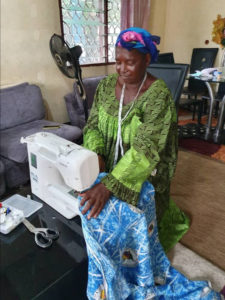 I am happy for this gift from Rising Hope Foundation of Change and its partner Sewing Peace. As a widow, I thought the world had forgotten about me. I was surprised when one of my mothers in church told me I was one of the lucky recipients of a sewing machine. I thought it was a joke until the coordinator himself called me to pick it up at the Centre. This machine is going to help me and my small family a lot. The 200 to 300 Francs we earn by patching dresses will help me buy breakfast for my children.
I am happy for this gift from Rising Hope Foundation of Change and its partner Sewing Peace. As a widow, I thought the world had forgotten about me. I was surprised when one of my mothers in church told me I was one of the lucky recipients of a sewing machine. I thought it was a joke until the coordinator himself called me to pick it up at the Centre. This machine is going to help me and my small family a lot. The 200 to 300 Francs we earn by patching dresses will help me buy breakfast for my children.
We all are going to improve our skills in sewing since the machine will keep us constantly working on small materials and children’s torn dresses. It is going to help me train my children in learning the art of sewing since we are not going to pay people to teach us again.
I pray that the lord almighty will bless Rising Hope Foundation for Change and their partner immensely.
Mangwi Ndi
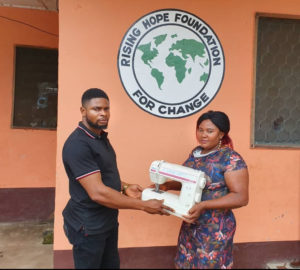 As an orphan who has spent more than 25 years in a remote village, I never knew people were so kind until I came to Limbe due to the ongoing Anglophone crisis. My boss introduced me to a matron of an orphanage who has a link with RHFC. That is how, after explaining my situation to the organization, I was lucky enough to get this sewing machine. Getting a machine from people I don’t know and haven’t heard of was a double miracle to me.
As an orphan who has spent more than 25 years in a remote village, I never knew people were so kind until I came to Limbe due to the ongoing Anglophone crisis. My boss introduced me to a matron of an orphanage who has a link with RHFC. That is how, after explaining my situation to the organization, I was lucky enough to get this sewing machine. Getting a machine from people I don’t know and haven’t heard of was a double miracle to me.
I am a seamstress by training but have been working for another person because I could not open a place of my own. This machine I just received will help me open my own shop and teach underprivileged girls and boys how to sew at a very low cost. Having this machine has given me full employment; it will help me earn money to build my future and take care of my needs like rent and family expenses. From my heart I pray the good Lord bless all the people supporting all the efforts of Rising Hope Foundation for Change.
Manka Synthia
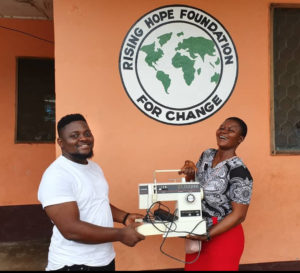 I am a single mother with 2 children. I was a farmer before the crisis started. When it became serious I had to stop going to the farm because of insecurity. I was advised by my landlady to learn a skill. She told me tailoring would be good because you can practice it until you are 70 years old. When going to do my hair at the Empowerment Centre of Rising Hope Foundation for Change, I overheard the members talking of the sewing machine program. I pleaded with them to put my name on the list in case they need single suffering mothers. To my great surprise I was called up for my special gift of a sewing machine. The machine will save me the money I was to pay for a new machine. It will help me learn fast since I will be learning at home and at the tailoring workshop. I think I will use the machine very well so that I can hand it down to my children when they grow. In the future I may also open a centre to train other single mothers like me.
I am a single mother with 2 children. I was a farmer before the crisis started. When it became serious I had to stop going to the farm because of insecurity. I was advised by my landlady to learn a skill. She told me tailoring would be good because you can practice it until you are 70 years old. When going to do my hair at the Empowerment Centre of Rising Hope Foundation for Change, I overheard the members talking of the sewing machine program. I pleaded with them to put my name on the list in case they need single suffering mothers. To my great surprise I was called up for my special gift of a sewing machine. The machine will save me the money I was to pay for a new machine. It will help me learn fast since I will be learning at home and at the tailoring workshop. I think I will use the machine very well so that I can hand it down to my children when they grow. In the future I may also open a centre to train other single mothers like me.
report from uganda, summer 2021
By Mathew Yawe, Executive Director, Mityana Open Troop Foundation
Summer 2021 Newsletter
On behalf of the Mityana Open Troop Foundation, I have compiled a progress report which I wish to present to you.
Mityana Open Troop Foundation (MOTF) is a registered Community Based Organization, with a Vocational Skills Training Centre, which Recruits and trains disadvantaged youths, young girls formerly selling sex for survival, girls expelled from school due to teenage pregnancies, and youths who dropped out of school due to Covid-19. All these youths are trained in sustainable vocational skills. Before the Covid-19 pandemic forced us to close, the vocational project had a population of over 100 trainees. Unfortunately, by the end of March 2021, the vocational project had an enrollment of 50 trainees!
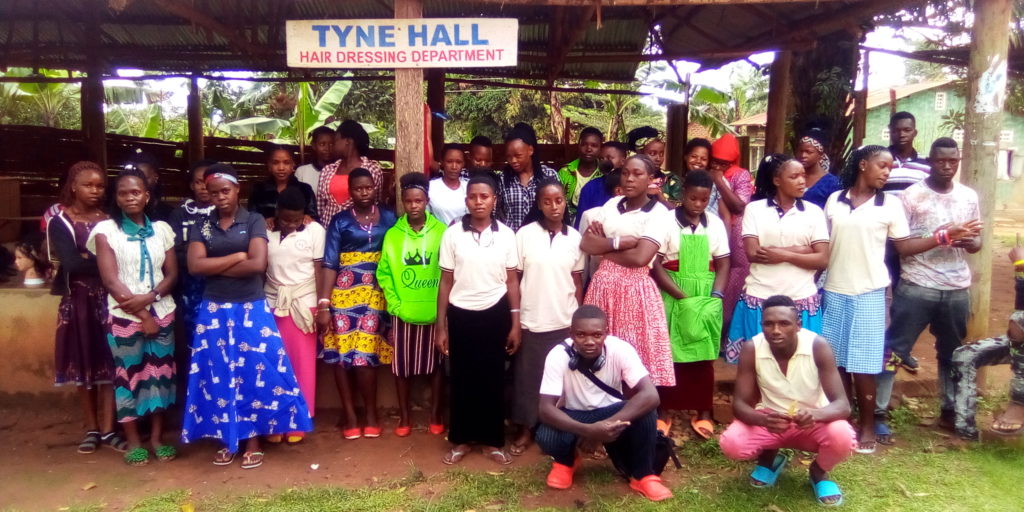 Since the inception of the Vocational Skills Training project in 2007, a total of over 800 have graduated. Some got employed while others have managed to set up their own shops. Every graduate of our program is given a sewing machine from Sewing Peace, USA. Without equipment, the graduation certificate is no help, as 90% of graduates can’t afford tools.
Since the inception of the Vocational Skills Training project in 2007, a total of over 800 have graduated. Some got employed while others have managed to set up their own shops. Every graduate of our program is given a sewing machine from Sewing Peace, USA. Without equipment, the graduation certificate is no help, as 90% of graduates can’t afford tools.
Students are trained for 2 years in Sewing & Fashion Design, Hair Dressing & Weaving, or Motor Vehicle Mechanics. Every year, there are 3 training terms of 3 months each; for each term the centre recruits whoever wishes to join.
Achievements
- The organization with the help from Mr. Chris James Eldridge of the UK, managed to fund another shipment of 71 sewing machines from Sewing Peace. The machines arrived at the project and have been put to use by trainees.
- To help prevent Covid-19, our sewing shop has been producing face masks and selling them at a price lower than our competitors’.
- In April 2021, the vocational project registered new trainees into non-formal skills training program. These are the youths who have dropped out of formal education as a result of socio-economic effects of Covid-19. Other youths have given birth during the 14-month school closure and can’t go back to their former schools.
Challenges and Limitations!
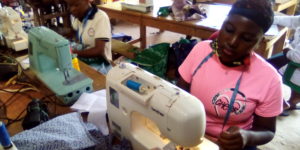 The Covid-19 lockdown of learning institutions has caused a number of students to drop out. Most parents lost jobs, and businesses no longer worked well, so parents could not pay school fees.
The Covid-19 lockdown of learning institutions has caused a number of students to drop out. Most parents lost jobs, and businesses no longer worked well, so parents could not pay school fees.- The prolonged lockdown caused many students to lose hope of returning to school. Many children were idle and moving up and down, which resulted in teenage pregnancies and sexually transmitted infections. Some students got petty jobs where they earned a little money and lost interest in going back to formal education.
- Because all training institutions have been under lockdown since March 2020, we have lost an entire year of income from school fees.
- The Organization still encounters challenges in raising funds for shipping sewing Machines from Sewing Peace.
- The sewing training workshop requires a new floor with tiles; the machines needs a strong floor. Currently the floor is dusty, which damages sewing machines.
- The vocational project needs be supplied with 80% manual sewing machines, as they are easier to repair than electric machines, which are expensive to repair when their gears and rollers fail. Even electricity is a challenge in some of our remote Ugandan communities.
- The Organization lacks a computer, printer, and photocopier, which we need to print end-of-term exams and other office documents. Currently all computer work is taken to town.
- The project requires a computer lab with internet access to enable our trainees to access zoom communication with other international students and exchange developmental ideas, and to access health-related issues, including Covid-19 information.
- The project requires a new embroidery machine that can use a USB drive and that can run faster. The current machine is slow and often needs routine maintenance and servicing.
- The Organization requires office furniture and a staff room, as instructors don’t have a place to sit and keep their kits.
- The Training Centre lacks clean water. There is a very small (2000-liter) water tank, which lasts 2 days. Then students have to go on foot 1 km in search of water from unprotected water sources. This has resulted in many cases of Typhoid.
- We have many cases of malaria among project trainees, as they lack mosquito nets. In every term we get over 85% malaria cases among trainees. Malaria is the disease with the highest death toll in Uganda.
- There is a great need of renovating training hall roofs, as all are broken due to leaking iron sheets.
Way Forward & Recommendations
- On the 13th of November 2021, we will hold our 8th Vocational Project Graduation Ceremony, where over 100 youths will be commissioned and awarded start-up kits in Hairdressing & Weaving, Sewing & Fashion, or Motor Vehicle Mechanics. You are invited please.
- We are fundraising for a new 2-classroom block, to enable us to create a conducive training environment and have room for more students.
- We need a new roof for the Tyne Hall workshop, where we teach Hair Dressing and Weaving.
- We need a new toilet for boys, who currently share facilities with girls, which is not recommended!
- We need embroidery machines with USB input, as the one we have is very slow and requires mechanical servicing all time!
- We welcome volunteers who can teach sustainable skills to our youths. We would like to partner with similar vocational training institutions elsewhere in the world. This will help us learn how they operate. Plus it will help our Ugandan youths create friendships with fellow youths and learn about their cultures.
Conclusion and Appreciations
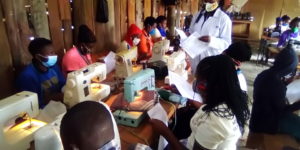 In conclusion, I thank Mr. Chris Eldridge, Mr. David Schweidenback of Sewing Peace, Mr. Colin Dippie and Mrs. Jane Louise Dippie, Mr. Nino Ardizz and Ms. Madison Ardizz, who have been so supportive to our organization. This has been and still is a very challenging season.
In conclusion, I thank Mr. Chris Eldridge, Mr. David Schweidenback of Sewing Peace, Mr. Colin Dippie and Mrs. Jane Louise Dippie, Mr. Nino Ardizz and Ms. Madison Ardizz, who have been so supportive to our organization. This has been and still is a very challenging season.
I extend our thanks to the generous communities of the USA who have been donating their used Sewing machines to our needy Ugandan communities. Please, the used sewing machines which seem unimportant in the USA have uplifted our communities, changing peoples’ lives by creating a daily source of income.
Furthermore, we extend our sincere appreciations to our new Rotarian & Scouts friends: Ms. Sarah Kim from South Korea, Ms. Ivonne Sencebe Reilley and Pat Curley of the USA, who are trying to raise funds for a computer lab and construction of a classroom block.
Please thank you so much.
I pray that every one is safe from the Covid-19 Pandemic.
Protected: report from togo, summer 2021
report from the philippines, summer 2021
Summer 2021 Newsletter
Rags2Riches (R2R) is a social enterprise established in 2007 that provides livelihood to artisans from poor communities in the Philippines. Reese Fernandez-Ruiz, the President & Co-Founder of R2R is a Rolex Young Laureate for 2010, which paved the way for the partnership with Sewing Peace.
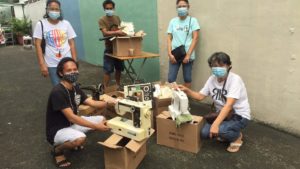 In October 2020 Reese Fernandez-Ruiz and David Schweidenback were interviewed by the Washington Post together for a dynamic new media article called Trash to Treasure Hunters, in partnership with Rolex.org. As both Reese and David are Rolex Awardees for the Environment, they shared their experiences on upcycling, recycling, and creating better opportunities for people through transforming waste into valuable assets. The partnership between R2R and Sewing Peace was a natural fit. R2R provides livelihood opportunities for artisans from the Philippines while Sewing Peace provides valuable livelihood-enabling assets such as sewing machines to communities in need. Not long after the interview was published, Reese and David continued their conversation and established a partnership.
In October 2020 Reese Fernandez-Ruiz and David Schweidenback were interviewed by the Washington Post together for a dynamic new media article called Trash to Treasure Hunters, in partnership with Rolex.org. As both Reese and David are Rolex Awardees for the Environment, they shared their experiences on upcycling, recycling, and creating better opportunities for people through transforming waste into valuable assets. The partnership between R2R and Sewing Peace was a natural fit. R2R provides livelihood opportunities for artisans from the Philippines while Sewing Peace provides valuable livelihood-enabling assets such as sewing machines to communities in need. Not long after the interview was published, Reese and David continued their conversation and established a partnership.
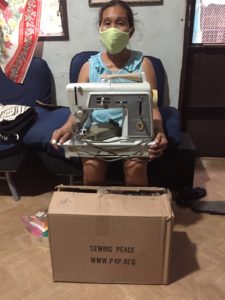 Sewing Peace shipped 35 beautiful and functional sewing machines to R2R in December 2020. All of these sewing machines were distributed to the main artisans of R2R. These machines enable the artisans to generate livelihood while staying home and keeping themselves and their families safe and healthy. All of R2R’s artisans are very grateful for these valuable tools that enrich their lives and create opportunities for them to support their families especially during this pandemic.
Sewing Peace shipped 35 beautiful and functional sewing machines to R2R in December 2020. All of these sewing machines were distributed to the main artisans of R2R. These machines enable the artisans to generate livelihood while staying home and keeping themselves and their families safe and healthy. All of R2R’s artisans are very grateful for these valuable tools that enrich their lives and create opportunities for them to support their families especially during this pandemic.
Sewing machines are incredible tools for artisans to be able to practice their craft while generating income for their families. R2R’s main tool has always been the weaving loom. However, sewing machines also emerged as another indispensable tool that, combined with the use of the weaving loom, could create unique and valuable masterpieces that could generate more income for artisans. R2R provides the training for sewing and weaving as well as continuous market access.
The sewing machines provided by Sewing Peace are valuable assets for artisans to lift themselves out of poverty and stay out of poverty.
report from tanzania, summer 2021
By Alan Schultz
Summer 2021 Newsletter
Pedals for Progress has received reports from The Norbert and Friends Missions, our partner in Tanzania. Their second container arrived on February 2, 2020, and was slightly delayed due to unexpected costs and delays with the Tanzania Revenue Authority. The container finally made its long-awaited arrival at the NFM headquarters and was immediately unloaded.
The Norbert and Friends Missions experience high demand for P4P bikes and sewing machines due to their reputation for quality. Word is being spread about the benefits of bikes and sewing machines. Norbert and Friends Missions are determined, and are showing, that they can continue to create a continuous, autonomous, and independent revolving fund. This has always been the primary goal when setting up new relationships with partners overseas and the Norbert and Friends Missions have successfully laid the foundation to do so. It is up to us on the domestic front to continue supplying their great demand. It has been a true inspiration to see the strides they are making.
The bicycles provided by P4P have garnered fame as they are reliable tools used by the community’s healthcare workers and farmers. Norbert and Friends Missions are reporting that farmers are increasing their production, as they can haul more product over greater distances. Healthcare is more accessible to community members, and on the inverse healthcare workers can access the community easier. School children are also making noticeable changes in attendance and their grades as they can get to school faster, and as a result, are less tired, allowing them to better focus on their schoolwork.
The Norbert and Friends Missions tell us the sewing machines and bicycles are also greatly impacting the lives of women and girls in their community. The bicycles are allowing women and girls to have reliable transportation that is safer for them than walking. Women and girls face disproportionate challenges getting transportation. However, bicycles provided by The Norbert and Friends Missions have been evening out this inequality. The sewing machines being provided also give women opportunities to create their own small business. The women doing so have been a great source of inspiration for younger generations. The women who are proving to be successful are also very motivated to pass on their skills by teaching younger generations and holding classes for the inexperienced. The sewing machines provide a regular income for people that have had no source whatsoever.
Please read these personal testimonials from The Norbert and Friends Missions. It is amazing to hear how motivated the organization is in changing their community. They wish to continue the spread of their work and have hopes of reaching every corner of their country to distribute the much-needed aid our bicycles and sewing machines provide. They certainly have this within their capacity, and we are very excited to continue to work with them to make this goal a reality.
Success Stories from Tanzania
Here are some stories from the community of The Norbert and Friends Missions, our partner in Tanzania. Norbert and Friends are located in Arusha, in northern Tanzania, not far from Mount Kilimanjaro. A couple of these stories are from the nearby Hai District.
Nzega and the P4P/SP Women’s Group
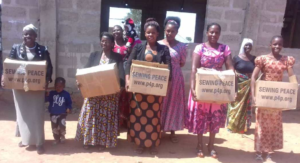 I take this opportunity to express my sincere gratitude for getting this sewing machine. Before I got it I couldn’t even buy my own clothes, but after getting this sewing machine I can now afford my own house. I have hired people to help me sell the clothes I make. Life has become easier. Now I wish to start a small college to teach my fellow girls to build their economy. Thank you very much P4P through The Norbert and Friends Missions.
I take this opportunity to express my sincere gratitude for getting this sewing machine. Before I got it I couldn’t even buy my own clothes, but after getting this sewing machine I can now afford my own house. I have hired people to help me sell the clothes I make. Life has become easier. Now I wish to start a small college to teach my fellow girls to build their economy. Thank you very much P4P through The Norbert and Friends Missions.
Our group would like to take this opportunity to express our sincere gratitude to The Norbert and Friends Missions. Now we are meeting in unity but lacking resources; we are praying for our donors to help us with more sewing machines.
Mariam Arbetus
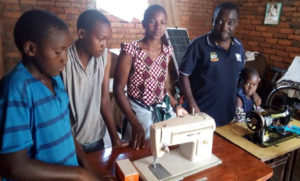 This family thanks the Organization for providing us with a sewing machine. We have now been able to talk about another sewing machine. We hope that my children also learn this skill as they have seen great benefits. Since we received the sewing machine it has opened the doors for my business, as I henceforth will look more professional. The Norbert and Friends Missions are the Hope for the hopeless, the Peace Makers and friends to the poor. May God help them continue reaching the unreached, and helping the left for themselves. God bless you very much.
This family thanks the Organization for providing us with a sewing machine. We have now been able to talk about another sewing machine. We hope that my children also learn this skill as they have seen great benefits. Since we received the sewing machine it has opened the doors for my business, as I henceforth will look more professional. The Norbert and Friends Missions are the Hope for the hopeless, the Peace Makers and friends to the poor. May God help them continue reaching the unreached, and helping the left for themselves. God bless you very much.
Sewing Peace Community Impact in Hai District
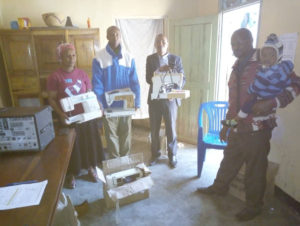 We don’t have good words to say because when we started this project we were two but now we have 12 of us. There is one who was wanting to run away from his family but after getting a sewing machine with this Group he found life has become much easier and he has managed a family services business and his children are now going to school. We just need to add a sewing machine. Thank you for helping us.
We don’t have good words to say because when we started this project we were two but now we have 12 of us. There is one who was wanting to run away from his family but after getting a sewing machine with this Group he found life has become much easier and he has managed a family services business and his children are now going to school. We just need to add a sewing machine. Thank you for helping us.
Manka
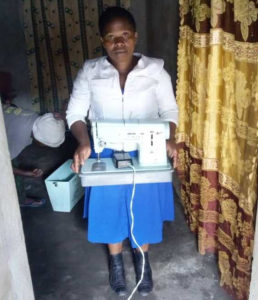 From the Hai District: Manka does not believe her eyes. “I was wondering how I could lead my life without any income.” Now she has seen so much benefit from managing her own sewing project and making her own money that she is thinking of opening a tailoring shop and hiring people who will help her manage her sewing business. “Many girls are suffering from poverty and lack of income even when they have professional skills. And yet many others would like to acquire tailoring skills but cannot afford it! I promise to reciprocate to the NFM by helping any women or girls who come my way for the sake of poverty alleviation. I know what it means living without income and how it hurts! May God Bless The Norbert and Friends Missions and their partners!”
From the Hai District: Manka does not believe her eyes. “I was wondering how I could lead my life without any income.” Now she has seen so much benefit from managing her own sewing project and making her own money that she is thinking of opening a tailoring shop and hiring people who will help her manage her sewing business. “Many girls are suffering from poverty and lack of income even when they have professional skills. And yet many others would like to acquire tailoring skills but cannot afford it! I promise to reciprocate to the NFM by helping any women or girls who come my way for the sake of poverty alleviation. I know what it means living without income and how it hurts! May God Bless The Norbert and Friends Missions and their partners!”
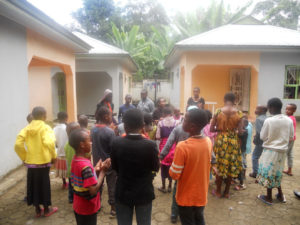 Demand for Bikes
Demand for Bikes
These you see here are students who have been in our office to ask for a bike after seeing their classmates with bikes do so well with attendance and exams. Students without bikes often walk a very long distance to school.
Coming Next Up
president’s message, summer 2021
From the beginning of the pandemic I was pretty sure our goal post was going to be April 2021. Of course we collected nothing in spring 2020 but did moderately well in the fall. We really expected a great spring 2021 season. Unfortunately most of our spring collectors are with churches and public schools, most of which were closed because of the pandemic. So rather than 30 spring collections, we had only seven. That moved our goal post to September 2021. In late August or September we will really be able to open up and collect a lot of bikes.
A funny thing happened last year. Our production totals in fiscal 2020 were down by 35% compared to 2019. But then last fall’s collections fell into fiscal 2021 and although we had very few collections in the spring of 2021, the Faith Lutheran Church of New Providence, New Jersey, collected 402 bicycles and two sewing machines in one day!
We had hoped to ship a minimum of three containers of bicycles and sewing machines in spring 2021 on the presumption of 25+ collections. The rollout of the vaccines has been a wonderful thing for everyone, but did not quite get here in time to save our spring season and its tiny total of 7 collections. That said, some days it just rains bikes. So we are in fact shipping a third container, Tanzania #8, on July 10th. In May, we shipped Rwanda #1 and Togo #4.
Thanks to all you donors and supporters of Pedals for Progress and Sewing Peace. We are making fundamental changes in the economic livelihood of thousands of people per year. While we empower individuals to be more productive because of bicycles and sewing machines, our partner organizations use their distribution business to make money for other projects, such as handicapped children’s schooling, skill training centers, and reforestation projects, to name just a few. And here in the US we prevent tons of used bikes and sewing machines from ending up in landfills. It’s a win-win-win.
With your support Pedals for Progress is going to come out of this pandemic stronger than before, with a laser-like focus on economic development and protecting the environment. Thank you for your continuing support. I am always appreciative of your generosity toward the most needy.
expansion of the p4p/sp board of trustees
By Alan Schultz
Summer 2021 Newsletter
Pedals for Progress recently celebrated thirty years of collecting bicycles and sewing machines to be sent to the developing world. The mission of the organization has been very clear over the years: to empower sustainable economic development by recycling bicycles and sewing machines from the US and shipping them to motivated people in the developing world. Among the 160,000 bikes and 5,000 sewing machines the organization has delivered to 46 countries around the world, we have been able to stick by our original mission statement and have helped countless communities, families, and individuals seek personal economic growth and development. We are constantly honored and humbled to help such a wide range of people around the world.
Our mission cannot be accomplished alone. The organizations, groups, and individuals we work with domestically that help collect bikes and sewing machines are key elements to our success. We have grown with many domestic partners over the years and have developed an incredible support system of people willing to be part of what we do. The growth of Pedals for Progress is incredibly reliant on these behind-the-scenes figures.
The growth of pedals for progress has blossomed on many fronts. From establishing new partners overseas, to growing our network of friends that spans beyond our tri-state area, there have been many areas of development across the organization. We strive to keep our growth steady, strong, and smooth. We focus much of our energy on maintaining our connections with domestic and international partners as they are the foundation of our organization. These relationships are very visible through the sheer number of items we collect at home and the fantastic stories we receive from the countries we work with abroad.
The growth of Pedals for Progress has mostly been visible in these important areas. However, an aspect of our organization that has remained relatively the same has been its internal operations. There is a very specific method to the madness that comes with orchestrating what we do. It has worked over the years, so we have stuck with it.
We have decided to look at these internal operations and decide where we could improve for the greater good of our cause. The greatest constant has been our board of trustees, which has remained relatively small and without much change. This has worked greatly in our favor as we have been able to perfect the growth of the organization in its domestic and international operations. To reach new heights, a well-rounded organization is willing to look at every angle of its operations to maximize the outcomes of its cause. With this in mind, we have decided to greatly expand out board of trustees in ways in which we never have done before.
Pedals for Progress has decided to seek a larger and more diverse group of individuals to be a part of its board to develop the organization from the inside-out, in hopes of expanding and further cementing the bounds of our mission to improve the lives of others. We are proud to say that our new membership will be expanding to 14 people to help aid the growth of our organization.
We are hopeful that the new board will help Pedals for Progress operate at its maximum capacity. We would like to introduce our new members and formally thank them for coming aboard the Pedals for Progress and Sewing Peace team. We are excited to see the impact they will make on the organization and have full confidence that their experience and expertise will serve the organization well.
Thank you to our new and current members.
Current:
- John Alexander, Treasurer
- David Schweidenback, President & CEO
- Andrew Williams
- Robert Zeh, Secretary
New:
- Jamie Acosta
- Jerry Agasar
- Daryl Detrick
- Anne Fitzgerald
- Sarah Jannsch
- Robert Loftin Jr.
- Richard Millhiser
- Steven Muentener
- Casey Walsh
report from sierra leone, june 2021
By Shed Jah
Summer 2021 Newsletter
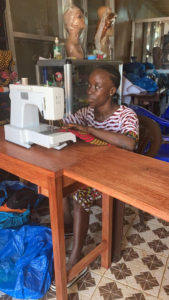 Isatu Kamara is a single mother. She is just returning to the country from the UAE, where she has spent almost 4 years with captors who tricked her into leaving Freetown for what they said was a greener pasture in the UAE. After 4 years as a sex slave, she was repatriated by the Sierra Leone government. With no home or savings, she was left begging to feed herself and her one-year-old son. She was living in abject poverty, sometimes bunking with her sister, who is herself barely surviving.
Isatu Kamara is a single mother. She is just returning to the country from the UAE, where she has spent almost 4 years with captors who tricked her into leaving Freetown for what they said was a greener pasture in the UAE. After 4 years as a sex slave, she was repatriated by the Sierra Leone government. With no home or savings, she was left begging to feed herself and her one-year-old son. She was living in abject poverty, sometimes bunking with her sister, who is herself barely surviving.
When we opened the fashion school it was meant to address the issue of lack of skills amongst our youth, especially girls. Isatu heard about us from a friend and enrolled immediately. These days she spends her days at the school whilst we watch her little son. She is very grateful and happy. In the near future we will provide a day care facility for the children in our community.
Isatu Kamara is one of the many vulnerable women who are benefiting from the sewing machines sent to Sierra Leone by Sewing Peace.
rwanda wildlife conservation association: new partner, 2021
By Alan Schultz
Summer 2021 Newsletter
In February 2021, Pedals for Progress celebrated thirty years of service collecting bicycles and sewing machines to be donated to developing countries around the world. Among the 160,000 bicycles and 5,000 sewing machines sent to 45 countries, Pedals for Progress has been able to facilitate the growth and development of countless communities, families, and individuals. These achievements are not met by happenstance. There are several moving parts in the machine that are required for the “progress” in Pedals for Progress to take hold.
The partners we work with overseas are among the most important components of our entire operation. Without the many groups we work with, distributing bicycles and sewing machines would be nearly impossible. Development of our cause and the further distribution of bicycles is reliant on building new relationships with communities unreached by Pedals for Progress and Sewing Peace.
As a crucial part of our development, Pedals for Progress is proud to announce a new partnership with the Rwanda Wildlife Conservation Association. We are very happy to be working with the RWCA, as they will be a relationship necessary to put our used bikes to good use in a region of the world that is challenging to access and distribute to.
 Oliver Nsengimana is the founder and lead conservationist in charge of the RWCA. Oliver and his team are dedicated to the conservation of Rwanda’s vast wildlife. The association’s flagship project is protecting the endangered species of grey crowned cranes, a species of crane that is on the brink of extinction. The grey crowned crane is often poached and captured by the nation’s wealthy classes as the crane is seen as a symbol of wealth and prosperity. For years, the gray crowned crane has been struggling to survive, as its natural population is dwindling. However, Oliver and his team have made massive developments through their program’s initiatives, which include rehabilitating illegally captured cranes, educating the public, and collecting data to track the reestablished growth of the gray crowned crane. The RWCA aims to continue their conservation of Rwanda’s rich wildlife focusing on other threatened species in the country.
Oliver Nsengimana is the founder and lead conservationist in charge of the RWCA. Oliver and his team are dedicated to the conservation of Rwanda’s vast wildlife. The association’s flagship project is protecting the endangered species of grey crowned cranes, a species of crane that is on the brink of extinction. The grey crowned crane is often poached and captured by the nation’s wealthy classes as the crane is seen as a symbol of wealth and prosperity. For years, the gray crowned crane has been struggling to survive, as its natural population is dwindling. However, Oliver and his team have made massive developments through their program’s initiatives, which include rehabilitating illegally captured cranes, educating the public, and collecting data to track the reestablished growth of the gray crowned crane. The RWCA aims to continue their conservation of Rwanda’s rich wildlife focusing on other threatened species in the country.
Paying attention to their local environment creates self-sustaining environmental procedures that have larger implications for building eco-tourism opportunities in the region. Building a strong team of conservationists who understand the larger implications of maintaining a healthy environment will lead to a community that is well equipped for maintaining a stronger, eco-friendly local economy. This new partnership is made merrier by our common connection with the RWCA. Oliver Nsengimana was named a Rolex Laureate in 2014 to honor and promote the work he and his team have done rehabilitating and reintroducing gray cranes back to the wild. In 2000, Pedals for Progress’s Dave Schweidenback was also named a Rolex Laureate, marking a pivotal moment in the company’s thirty-year history. Rolex is responsible for this new connection between the RWCA and P4P.
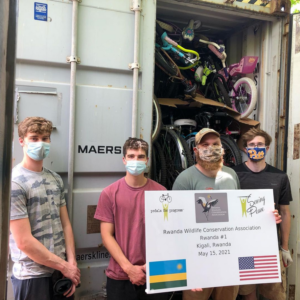 Together, the fellow alumni of the program will now begin to break new ground as partners and continue environmentally conscious acts of service to the world. In fact, we are proud to announce that on May 15th we sent our very first container to Rwanda: 503 bikes and 43 sewing machines. In six months a second container of goods will be on its way to Rwanda to further cement our partnership. The bicycles will be a great help to the RWCA and the people in the surrounding communities. Bicycles will go directly to the RWCA to help their conservationists cover more ground to collect more data necessary for the development of their many environmental efforts. The RWCA is also involved in activities with local schools and youth clubs, community campaigns, and rangers that will receive the bikes to generate their own self-sufficient enterprises made possible by the bicycles and sewing machines.
Together, the fellow alumni of the program will now begin to break new ground as partners and continue environmentally conscious acts of service to the world. In fact, we are proud to announce that on May 15th we sent our very first container to Rwanda: 503 bikes and 43 sewing machines. In six months a second container of goods will be on its way to Rwanda to further cement our partnership. The bicycles will be a great help to the RWCA and the people in the surrounding communities. Bicycles will go directly to the RWCA to help their conservationists cover more ground to collect more data necessary for the development of their many environmental efforts. The RWCA is also involved in activities with local schools and youth clubs, community campaigns, and rangers that will receive the bikes to generate their own self-sufficient enterprises made possible by the bicycles and sewing machines.
Our new partnership with the RWCA, following our 30-year celebration of operation, shows the continued growth of Pedals for Progress. We are happy to be able to continue to create new relationships with organizations that have like-minded goals of creating environmentally sound solutions to develop the growth of communities in need.

